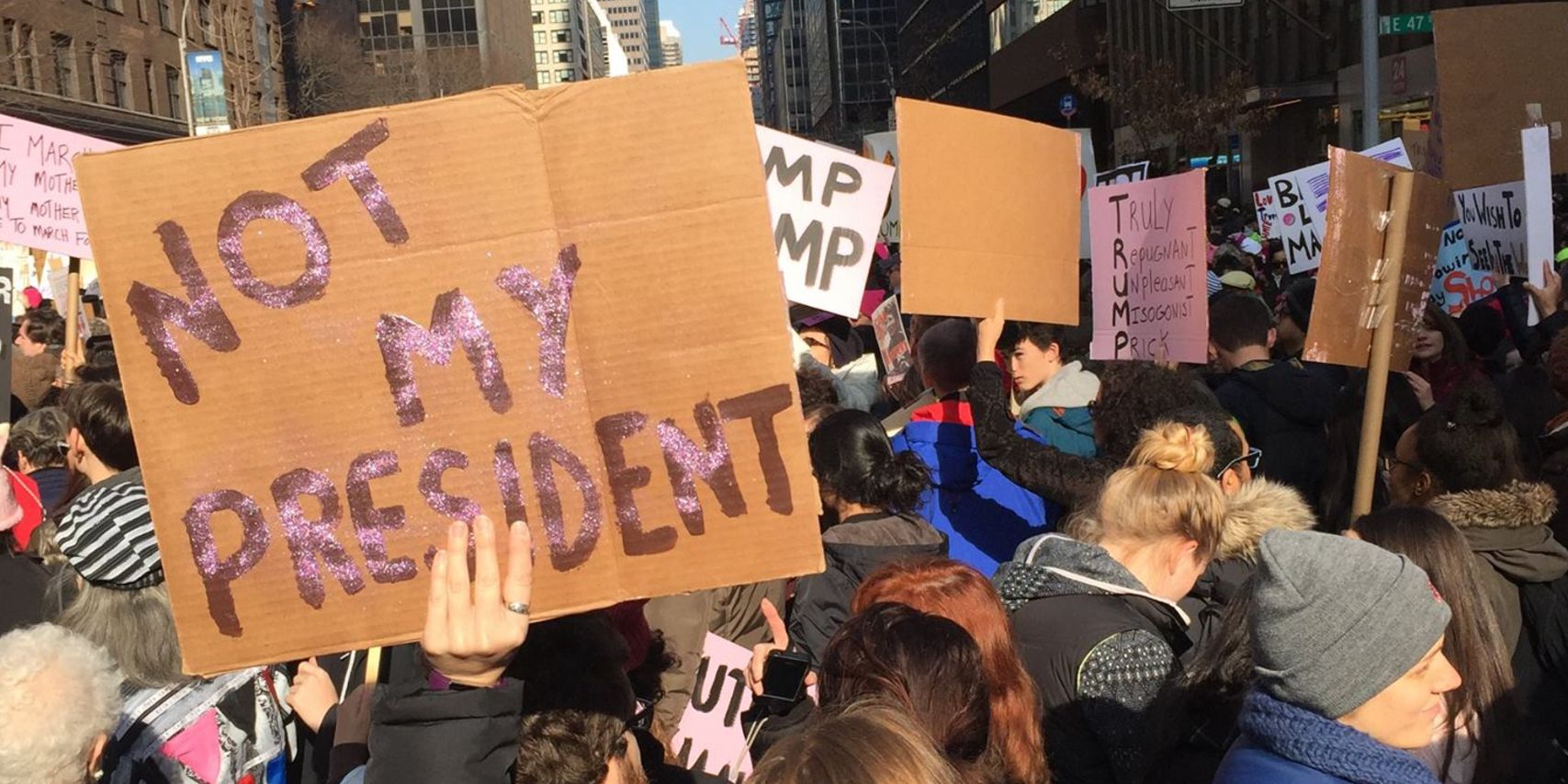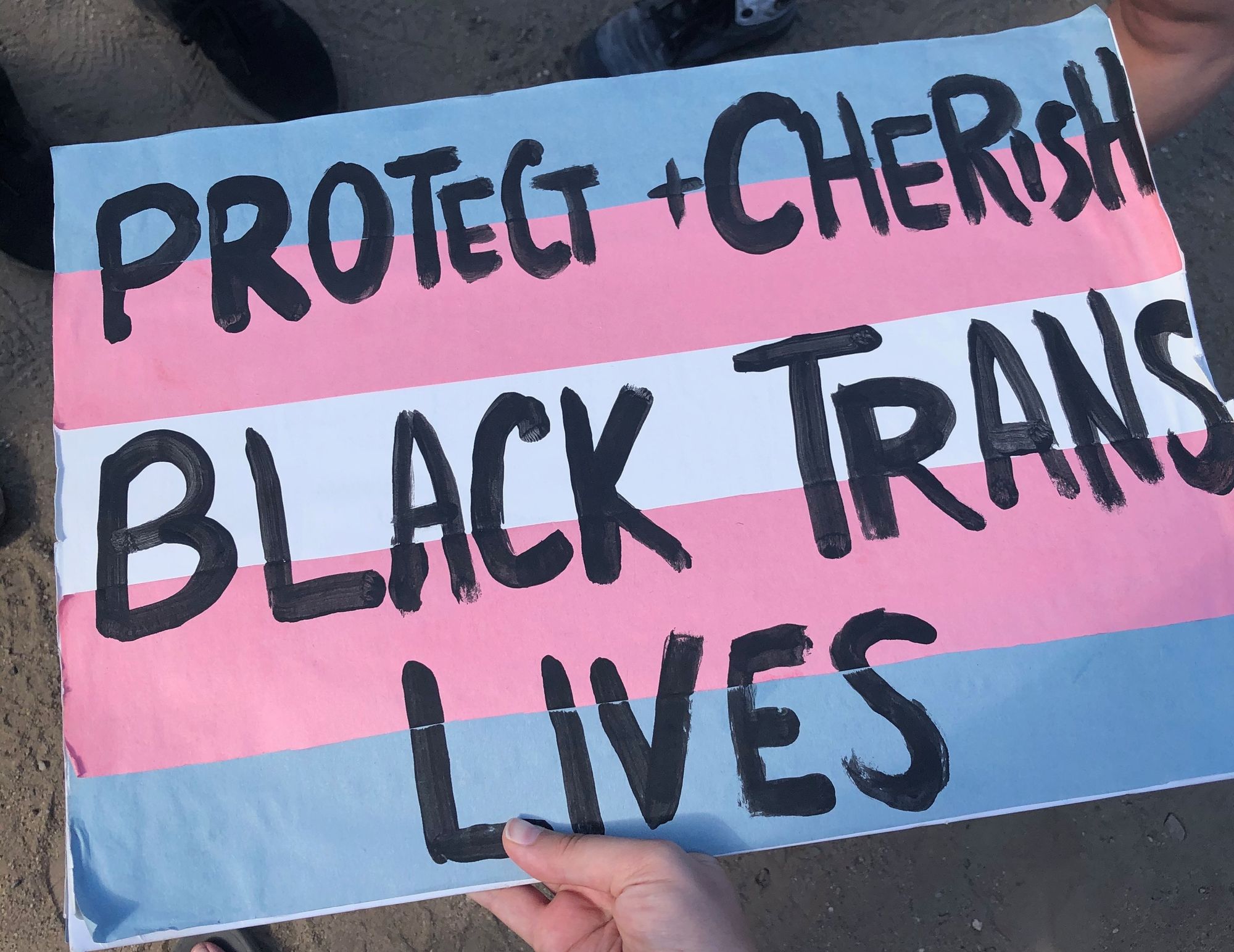The march for Black trans lives was everything the Women's March wasn't
We can ask more of mainstream activism!

In January 2017, I was one of seven million people worldwide participating in the first Women’s March after Trump’s election. In that dark time, when we knew it would be getting worse but we weren’t yet sure in what ways and by how much, the solidarity felt energizing to me. I wasn’t expecting the mood to be so buoyant since it was organized in opposition to a man who made me feel nothing but dread and rage, but the chants and general camaraderie did create a positive, hopeful atmosphere. I left feeling encouraged for the first time since the election.
But the Women’s March had flaws. Some were noticeable to me at the time, but not all. Mostly, it stood for the kind of mainstream, corporate-friendly feminism that mostly empowers white cisgender women. The nebulous concept of women’s rights in general is the most palatable form of activism.

This past weekend, I went to a completely different kind of march. Brooklyn Liberation, the largest trans-focused demonstration in history, was everything that the Women’s March was not: inclusive, specific, and genuinely radical.
The purest distillation of the problems with the Women’s March was the since-viral sign slogan “If Hillary had won, we’d be at brunch right now.” The self-absorption of the sentiment was the perfect example of the kind of activist who wouldn’t feel the need to disrupt the comfort of their everyday life except for their own self-preservation. I wasn’t the only one who felt energized by attending the march, but lifting the spirits of some cisgender white women like myself is not in and of itself an admirable accomplishment. It’s not clear that the march accomplished anything at all, in fact. While it’s possible that the energy of the Women’s March encouraged more women to run for office, that outcome is just as linked to general anti-Trump sentiment. There’s certainly value to a worldwide demonstration of support for women, especially after an election proving how many Americans endorsed misogyny, but it ultimately functioned as little more than a reminder that the personal remains political. The historic numbers and media attention that the event generated should have created more momentum toward actual change.
Perhaps the reason that it failed to do so is because both its organization and participation centered white cisgender womanhood. The popularity of attire and signs referencing cisgender female anatomy was exclusionary. As Marie Solis wrote, “pussy hats set the tone for a march that would focus acutely on genitalia at the expense of the transgender community. Signs like ‘Pussy power,’ ‘Viva la Vulva’ and ‘Pussy grabs back’ all sent a clear and oppressive message to trans women, especially: having a vagina is essential to womanhood.” Transgender activist Evan Greer pointed out that only three of the 60 speakers at D.C.’s rally were trans, none of the performers were trans, and no speakers or performers were nonbinary or genderqueer.
Black writer Jamilah Lemieux skipped the march entirely, explaining that she didn’t feel a sense of sisterhood with white women after learning that 53% of us voted for Trump — especially, as she pointed out, when the event meant to unite all women had to change its name after co-opting that of the 1997 “Million Women March” that focused on Black women specifically. Other women of color took issue with the fact that the restraint of police at the march was a clear indicator of the privilege afforded to a majority-white demonstration, a privilege that white attendees who proudly high-fived cops seemed to blithely overlook.
Brooklyn Liberation shows us that we can and should ask for more from our activism.

First of all, it was the most organized such event I’ve ever attended. According to the New York Times, “over 150 people joined the organizing team — many of them nonblack queer people of color who volunteered to work under the direction of Black transgender-led organizations like the Okra Project and the Marsha P. Johnson Institute.” It was obvious even before we arrived that the event had been planned thoughtfully and intentionally. Clear guidelines for dress, behavior, and accessibility were provided ahead of time. At the rally before the march, bathrooms were available, and drivers wearing hot pink bandanas for easy identification offered free rides to those who needed them. It was wheelchair-accessible with seating available for the disabled, and both an ASL interpreter and a Spanish translator were present for the speeches.
While the Women’s March was political, its feminism was watered down by a one-size-fits-all approach by its organizers. When asked if women who opposed expanding access to abortion would be welcome, its co-chair Carmen Perez replied, “I believe that the Women’s March is a space for all women. When women feel a desire to participate in the Women’s March, they may not agree with every piece of the ideology, they may not agree with the whole feminist platform, but I’m sure there’s something that they do agree with.” Her wishy-washy answer reflects a milquetoast approach to activism that’s more concerned with “you go girl!” empowerment than with actual political change.
In order to change anything, you need to challenge the existing status quo. I hadn’t quite realized the extent to which that was possible before I attended Brooklyn Liberation. The imagination, care, and focus of the Black trans people directing the organization meant that the event centered and cared for Black trans attendees specifically. Food trucks provided free food to Black trans people. They were welcomed to the front of the rally and later of the march, while white and cis allies were instructed to remain on the perimeter. One of the speakers at the rally, activist Raquel Willis, called out the fact that queer people in power within the political establishment are almost all white and cisgender, and added that the strides that the queer community often celebrates don’t uplift everyone. “White queer folk get to worry about legislation,” she said, “while Black queer folk are worrying about our lives.” When the crowd reconvened in the park after the march, other speakers challenged us to think outside the restrictions that have been in place for so long. “We are done appeasing to white people!” said Ianne Fields Stewart. “We’re gonna get ourselves free. And we’re gonna get ourselves free TODAY.” On the topic of the current administration, she said, “We are, and have always been, more powerful than the people they elect to those offices!” Ceyenne Doroshow listed off ways in which those in power disregard the queer community. “What do we say to that?” she asked into the megaphone, prompting us to reply in unison: “I don’t give a fuck!”
A convergence of factors contributed to the size and strength of Brooklyn Liberation. Its high attendance rate was certainly bolstered by the dual facts that the pandemic has given a huge portion of the population the time to be on the streets, and the current Black Lives Matter protests have given more people the motivation to. But Black trans people, and especially Black trans women, are always at risk and always need our support.
As I see companies vaguely embracing the phrase “black lives matter” as a virtue-signaling slogan and even Mitt fucking Romney feels comfortable joining a protest for the cause, I worry that the actual intent of the movement is undergoing the same kind of mainstream whitewashing that the legacy of Martin Luther King Jr. has. Brooklyn Liberation showed me how we need to carry the message forward: with intentional inclusion and access, an uncompromising message, and with the most marginalized in our society at the center and in leadership positions.
More like this:
“There are more of us than there are of them.”
Ways you can help support Black trans people:
- This link lets you donate to a bunch of Black trans-focused organizations at one time!
- Here’s a list of other ways to help, including petitions to sign and ways to advocate for trans-inclusive healthcare
- Follow more Black trans activists on your social medium of choice to stay informed of key issues and aware of the Black trans perspective. You can start with the speakers at Brooklyn Liberation, whose handles are listed at the bottom of this page.
